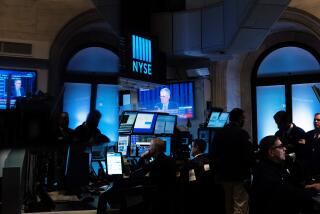Brokered CDs: Liquidity, High Yields With Risk
- Share via
Looking for high-yielding certificates of deposit but don’t want to pay early withdrawal penalties if you need your money back before maturity?
Then consider the world of brokered CDs--a type of CD that can be bought and sold through securities dealers.
Sales of these CDs--similar in many ways to CDs issued by banks and savings and loans--have boomed since last summer, when investors grew increasingly wary of the stock market and began looking for safer havens.
No wonder that, since the crash, many brokerages are marketing them aggressively. Merrill Lynch, for example, is expected to announce this week a new “junk bond” brokered CD program offering high yields on the deposits.
“Our business in the past three or four months has been outstanding,” says Phyllis S. Rector, head of taxable fixed-income trading at the Los Angeles brokerage of Bateman Eichler, Hill Richards. The firm’s brokered CD business is up 50% since last summer, she says.
For investors who need liquidity and are willing to accept a slightly higher risk than conventional CDs, brokered CDs can be good deal. And they often pay higher yields than your local bank or S&L.;
But they carry risks and costs, and thus may not be for the ultraconservative investor who wants absolute assurance he will always get at least his principal back at any time.
A brokered CD, in fact, is a bank or S&L; CD that is sold by a stock brokerage, which buys it from any of a number of banks or S&Ls; nationwide. These CDs, obtainable simply by opening an account at one of the many brokerages that offer them, generally can be purchased for as little as $5,000. They pay interest just like bank CDs and are fully insured up to $100,000 per institution by the Federal Deposit Insurance Corp. or the Federal Savings & Loan Insurance Corp.
The principal difference is that they are traded like stocks and bonds. Thus, if you need your cash back for some reason before the CDs mature, you can simply sell the CD back to the brokerage. You will not pay early withdrawal penalties because the brokerage will simply resell the CD.
Commission Costs
The lack of withdrawal penalties is a key advantage. At some banks, you can lose as much as six months interest for early withdrawal on CDs of one year or longer, says Robert Heady, editor of Bank Rate Monitor, a North Palm Beach, Fla., newsletter that tracks bank CDs.
There are, however, some key risks and costs to brokered CDs.
The cost is in the form of a commission that the brokerage builds into the price of the CD, in the form of a “bid-ask spread” similar to the spread on many bonds and stocks. That spread is the difference between what you must pay to buy the CD and the price you would get for selling it at that same time to the same broker.
At Bateman Eichler, the bid-ask spread for a one-year brokered CD is $2 per $1,000, while on a five-year CD, it is $15 per $1,000, Rector says. With such a cost, you don’t want to buy and sell them frequently if you can avoid it.
The main risk is the potential that--like bonds and stocks--you could lose part of your principal if you have to sell the CD back before maturity. That is because, like bonds, the price of brokered CDs rise and fall according to prevailing interest rates.
If prevailing interest rates rise, the value of these CDs will fall because no one will pay face value for your CD if they can get a new, higher-yielding one at face value. However, if interest rates fall, your CD will rise in value, and you could make handsome profits just like many holders of long-term bonds did between 1982 and 1986, when interest rates were falling.
Just as with bonds, the price fluctuation risk of brokered CDs rises the longer the maturity. A one-year CD typically fluctuates in value as much as 10%, while a five-year CD fluctuates in price as much as 40% for each percentage point change in interest rates, says Bateman Eichler’s Rector. Also like bonds, the only way to ensure that you get all your principal back is to hold the CD until it matures.
Why take this risk when with bank CDs you can always get your principal back at any time if you are willing to forgo some interest through the early withdrawal penalty? Because, Rector says, with bank CDs you don’t have the same potential for profit. “In a bank CD all you get is downside risk,” Rector says.
A potential hassle could occur in a failure of the bank or S&L; that issued the CD. Although brokered CDs are fully insured, you may have to wait a longer time to get your money back than you would have had you bought the CD directly from the institution.
Another hassle could occur if the brokerage fails. In that case, you would be protected for $500,000 if your CDs are fully paid for and the brokerage is a member of the Securities Investor Protection Corp. Most are. You still may have to wait awhile before your money is returned.
Careful Shopping Pays
In exchange for this risk, yields on brokered CDs often are somewhat higher than you would get on Treasury bills and notes. Five-year brokered CDs, for example, now yield 7.8% to 8.05% (including the cost of the commission), while five-year Treasuries yield 7.50% (including commissions), Rector said.
What to do?
Shop carefully for brokered CDs to make sure you get the lowest price and best yields, being fully aware that some higher yielding CDs may be issued by troubled banks or S&Ls; that need the cash to stay afloat. If you can’t stomach the price volatility, stick to short-term brokered CDs.
However, if you are certain you don’t want the price fluctuation--and don’t mind the possibility of paying early withdrawal penalties--you may get higher yields by shopping nationwide for the highest yielding bank or S&L; CDs and depositing directly with them, says Heady of Bank Rate Monitor.
More to Read
Inside the business of entertainment
The Wide Shot brings you news, analysis and insights on everything from streaming wars to production — and what it all means for the future.
You may occasionally receive promotional content from the Los Angeles Times.









